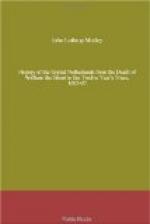“This is the marrow of our conference,” said Aerssens to Barneveld, reporting the interview, “and you may thus perceive whither are tending the designs of his Majesty. It seems that they are aspiring here to the sovereignty, and all my letters have asserted the contrary. If you will examine a little more closely, however, you will find that there is no contradiction. This acquisition would be desirable for France if it could be made peacefully. As it can only be effected by war you may make sure that it will not be attempted; for the great maxim and basis of this kingdom is to preserve repose, and at the same time give such occupation to the King of Spain that his means shall be consumed and his designs frustrated. All this will cease if we make peace.
“Thus in treating with the king we must observe two rules. The first is that we can maintain ourselves no longer unless powerfully assisted, and that, the people inclining to peace, we shall be obliged to obey the people. Secondly, we must let no difficulty appear as to the desire expressed by his Majesty to have the sovereignty of these provinces. We ought to let him hope for it, but to make him understand that by ordinary and legitimate means he cannot aspire to it. We will make him think that we have an equal desire with himself, and we shall thus take from those evil-disposed counsellors the power to injure us who are always persuading him that he is only making us great for ourselves, and thus giving us the power to injure him. In short, the king can hope nothing from us overtly, and certainly nothing covertly. By explaining to him that we require the authorization of the people, and by showing ourselves prompt to grant his request, he will be the very first to prevent us from taking any steps, in order that his repose may not be disturbed. I know that France does not wish to go to war with Spain. Let us then pretend that we wish to be under the dominion of France, and that we will lead our people to that point if the king desires it, but that it cannot be done secretly. Believe me, he will not wish it on such conditions, while we shall gain much by this course. Would to God that we could engage France in war with Spain. All the utility would be ours; and the accidents of arms would so press them to Spain, Italy, and other places, that they would have little leisure to think of us. Consider all this and conceal it from Buzanval.”
Buzanval, it is well known, was the French envoy at the Hague, and it must be confessed that these schemes and paltry falsehoods on the part of the Dutch agent were as contemptible as any of the plots contrived every day in Paris or Madrid. Such base coin as this was still circulating in diplomacy as if fresh from the Machiavellian mint; but the republican agent ought to have known that his Government had long ago refused to pass it current.
Soon afterwards this grave matter was discussed at the Hague between Henry’s envoy and Barneveld. It was a very delicate negotiation. The Advocate wished to secure the assistance of a powerful but most unscrupulous ally, and at the same time to conceal his real intention to frustrate the French design upon the independence of the republic.




